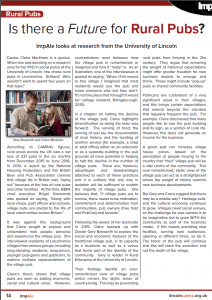This week we heard MP’s demanding that BT Openreach “gets it house in order”. http://www.bbc.co.uk/news/business-36832505 While this now has the attention of the national stage, these criticisms are nothing new, and the slow provision of broadband services to rural areas is not a uniquely British problem either.
Research I have done with Koen Salemink and Dirk Strijker at the University of Groningen in the Netherlands, has shown that national providers continue to service urban areas with faster internet connections while leaving more peripheral regions poorly served.
There is a clear paradox where the more peripheral regions that are arguably most in need of improved digital connectivity are the very regions which are the least well connected. Faster broadband connectivity or “Next Generation Access” may not be a public service itself, but many other public services – for example healthcare, internet banking, and e-Government – are dependent upon reliable internet with sufficient bandwidths and speeds.
Broadband internet is increasingly viewed as a utility, but the provision of better internet services has been strongly linked with regional economic growth. However, unlike other utilities that have been state-provided and subsequently privatised, BT Openreach’s project is being rolled out through complicated mechanisms where private firms compete for state-sponsored contracts.
This free market rationale where competition forms the basis for improving digital connectivity leaves some people excluded because they are deemed too costly to serve in relation to the income that would be generated. In the Netherlands, this situation has been exacerbated in scenarios where the larger villages are served early on and as a result, the remaining outlying villages and hamlets become even less attractive to commercial providers who cannot generate the necessary economies of scale.
Where less attractive rural areas are deemed unprofitable for smaller providers, the largest national providers like Openreach acquire an effective monopoly.
Only when local communities take action and try to work with smaller partners to deliver innovative solutions does realistic competition arise. New research at the community level has identified a number of local broadband initiatives which demonstrate that communities with the right blend of skills and enthusiasm can create their own solutions. Our research has found that this type of activism can have the effect of signalling to larger market players like Openreach, or KPN in the Netherlands, that they must act if they wish to retain their monopoly. Promises of lower cost “universal” provision can thwart local initiatives, but even then they can still take many months to come to fruition.
Moving forwards, we need to recognise that there is an increasing array of technologies that can provide access to broadband and which could reach the so-called last five per cent. These will vary according to both the topography and the make-up of local populations.
With a large share of this unserved five per cent in rural areas, we are already seeing some rural businesses being forced to relocate to keep up with their competitors. Combined with the quality of broadband provision being increasingly factored into house prices, the risks of economic decline in these rural areas are very real – but seemingly permissible because of percentage-based coverage targets that leave pockets of exclusion.
This “rural penalty” was first noted by Edward Malecki in 2003 in the USA, but despite champions of internet investment claiming that this can eradicate the costs of distance, the full potential for ICT to boost rural economies has not yet been realised.
 Research by Claire Markham has hit the front cover of the Local Campaign for Real Ale magazine “Impale” http://www.lincolncamra.org.uk/test/wp-content/uploads/2016/09/impale3_16.pdf
Research by Claire Markham has hit the front cover of the Local Campaign for Real Ale magazine “Impale” http://www.lincolncamra.org.uk/test/wp-content/uploads/2016/09/impale3_16.pdf